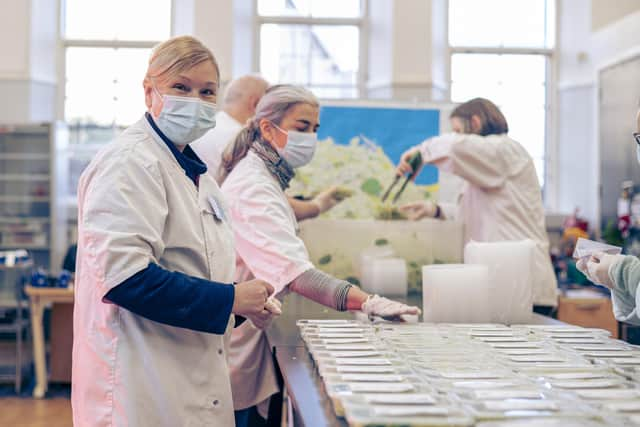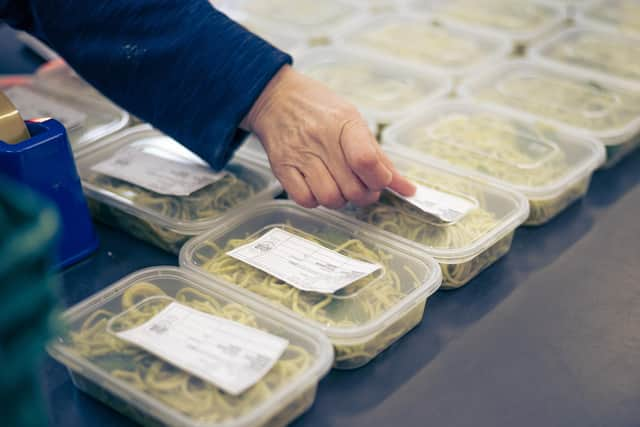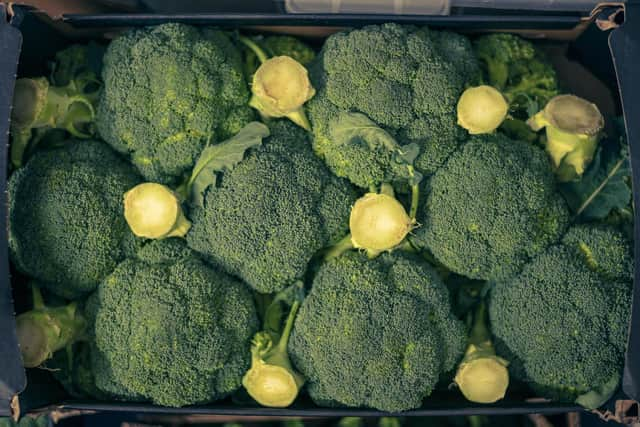We are what we eat: How our broken food system is wrecking lives
Cases of malnutrition in children have risen dramatically over the past few years and obesity is also rocketing.
Two out of three Scottish adults are overweight, with rates in young children suggesting this is set to increase.
Advertisement
Hide AdAdvertisement
Hide AdA diet of calorie-dense, nutrient-deficient foodstuffs has been blamed.
The consequences are clear but the reasons we have arrived at this point are complex – and compounded by the current state of the world.
The Covid-19 pandemic, war in Ukraine, Brexit and extreme weather linked to climate change have all had an impact on the availability of supplies of food and the price we pay for it.
The current cost of living crisis is seeing shocking levels of ordinary people unable to afford to put meals on the table, with use of food banks and other charitable services ballooning.
Scotland and the north of England have the highest levels of food bank use in the UK. The most recent annual figures show almost 200,000 Scots used a food bank in the year up to March 2022, a drop from the year before but considerably higher than pre-pandemic.


Meanwhile, more and more community kitchens have been springing up to help out the worst affected.
Local grocers, butchers, fishmongers and bakers have all but vanished from high streets in most places, while big supermarket chains open up new stores in every available corner.
As a result people are relying ever more on convenience food, with many having never learned to cook.
Advertisement
Hide AdAdvertisement
Hide AdThe likes of Tesco, Sainsbury’s, Asda, Aldi and Lidl have been pocketing record profits since the coronavirus outbreak began.


At the same time farmers who produce the ingredients are struggling to break even.
“If you fix food you fix everything,” according to Mike Innes, head of operations for Empty Kitchens Full Hearts (EKFH), an Edinburgh-based charity providing meals for people struggling to feed themselves.
“Food can be one of the great healers in society but it can also cause quite a lot of society’s ills.
“If you look at the way Scotland feeds itself just now – unhealthy food tends to be the cheapest.


“You can see the impact that is having on our nation’s health as a consequence.”
EKFH was set up in 2020, in response to the pandemic, by a group of furloughed chefs who wanted to use their skills to help others during lockdown. They started out delivering lunch and dinner to 100 people each day, but numbers rocketed to 1,500 at the peak of their work.
What is perhaps unexpected, however, is that restaurants and businesses reopened and the chefs went back to their usual jobs but the charity has continued.
Advertisement
Hide AdAdvertisement
Hide AdWhy? Because there is still a need. More than 650 people are currently registered to receive food deliveries, and the numbers have recently been growing – with around 20 new customers signing up each week.
“We got here because we handed over power to the big supermarkets,” Innes said.
“Where you shop wants to provide you with convenience, and we have fallen into the trap of paying for convenience at the expense of losing skills and knowledge and understanding.


“That’s unfortunately the position we find ourselves at.
“Back when there were local butchers and fishmongers they would have been handing down information, selling you cheaper cuts if you were in need and teaching you how to cook them and make something really tasty.
“I think by losing all these small independent producers we’ve lost a lot of the knowledge that goes with it.
“Farmers now can’t make a profit because everything is so cheap. The only metric that our food system cares about in the UK at the moment is cost – as cheap as possible – and that only works for the way the system is just now.”
According to Professor Marion Nestle, a molecular biologist, nutritionist, author and public health advocate from the US, there are three major world problems related to food.
These are: not enough, leading to food insecurity, hunger, malnutrition; too much of the wrong kinds, causing ill health; and the environmental impacts of production and consumption food – greenhouse gas emissions, pollution of soil and water, food waste, plastic waste, antibiotic resistance, microbial infections and harmful chemicals.
Advertisement
Hide AdAdvertisement
Hide Ad“On top of this we can add in vulnerability to supply chain disruptions and increased susceptibility to poor outcomes from Covid-19,” she said.
“The list goes on. All of these are results of dysfunctional food systems.”
The professor – who is coming to the Scottish capital this month to receive the prestigious Edinburgh Medal from the Edinburgh Science Festival, in recognition of her contribution to the understanding of science and the wellbeing of society – believes the dysfunction stems from the fact food systems are designed for corporate profit rather than public health or sustainability.
She said: “Companies are not required to pay the external costs – health and environmental – of the foods they produce. They are not required to care how much damage they cause; their sole priority is returns on investment to stockholders.”
And the big supermarkets hold all the cards.
Perthshire farmer Martin Kennedy, Scotland president of the National Farmers Union (NFU), says part of the problem is “an inherent lack of fairness around risk and reward” in many supply chains, warning that things will get worse if the issue is not addressed.
“The sight of empty shelves and ongoing future food security concerns are a crystal-clear sign that our food chains are not working in the best interests of consumers or food producers,” he said.
“Agriculture always has been a long-term industry and always will be. Many farms look forward at least five years ahead when it comes to crop rotations.
“In the livestock sector, when a heifer calf is born and is destined for the breeding herd, it will be five years before the progeny of that calf might be ready for the marketplace.
Advertisement
Hide AdAdvertisement
Hide Ad“It is the primary producer that takes the vast majority of the risk. For example, if bad weather strikes at the wrong time of year and we were to lose a high-value fruit or veg crop, all that loss lies with the producer.
“Retailers in general have no long-term concerns about weather or disease in a crop, they only have a short-term risk period from purchase to sale – and, more often than not, have the money in the bank from sales at the till before the supplier is paid.
“Given the lion’s share of the costs are borne by the food producer many months before the consumer purchases their product, this is certainly not what I would call fairness.”
It also generates unnecessary waste.
There is not one silver bullet to solve all the problems. But there is no doubt action must be taken.
“This requires a system change to overcome what is referred to as policy inertia due to captured government, power in the hands of corporations, and weak civil society,” according to Nestle.
“Governments need to better regulate the unhealthful practices of corporations – stop them from marketing to children and requiring them to pay the externalised health and environmental costs they generate, for example. I also favour strengthening civil society – that would be good for democracy anyway.”
Farmers are also pushing for more support from leaders.
“We will continue to work hard to make governments sit up and realise that if this doesn’t get addressed soon, there will be a risk of even more empty shelves than is currently the case,” Kennedy said.
“Given the current volatility that has played havoc with market prices both on costs and income, it’s little wonder many farmers and crofters are considering their future and to what degree they want to continue to take the biggest share of the financial risk without a fair return.
Advertisement
Hide AdAdvertisement
Hide Ad“While supermarkets continue to focus on profits, their customers will agree that a fairer share of the margin for farmers and crofters is thoroughly deserved.”
Innes says we need to improve education about food, increase knowledge about how it’s grown, what is good for you and how to cook – particularly for the more deprived communities.
“To know food and to understand food should be something for everybody,” he said.
“One of the words I hate most in the English language is ‘foodie’. I think it’s a very divisive word and actually it is a kind of ‘othering’.
“So if you are a foodie you understand food, but actually the term tends to be utilised by the more middle class, more wealthy. But it’s not just a preserve of the rich. It is something everyone needs to have a basic understanding about.
“And we need to stop handing over power to big corporations to provide food, pushing everything down to the lowest common denominator – it’s a race to the bottom, for everything to be cheapest.
“They just want to provide convenience but what we do is forget about the power of food, the power of cooking together and eating together and how much of a leveller these things can be.
“We need to realise how powerful it can be for society to cook together, eat together and embrace food – good, local, seasonal food.”
Advertisement
Hide AdAdvertisement
Hide AdThe Scottish Government is currently developing a new Agriculture Bill, which will shape the country’s post-Brexit farm subsidy system.
Three priorities have been outlined: a move to sustainable and regenerative farming, with farmers and crofters expected to play an active role in achieving environmental targets for emissions cuts and nature restoration; produce high-quality, nutritious food locally and sustainably; and maintain thriving rural and island communities.
Nourish Scotland, a charity on a mission to achieve a fair, healthy and sustainable food system, is campaigning for the ‘right to food’ to be included into Scots law in order to increase pressure on the government to ensure everyone in Scotland is able to access a healthy diet.
Executive director Pete Ritchie says fixing the food system should be “a top tier issue” for new First Minister Humza Yousaf and his cabinet – and has a few suggestions.
“Short-term – more cash for a food insecurity fund, like the fuel insecurity fund which has just been trebled,” he said.
“Long-term – deliver on the right to food, raising social security and the living wage so everyone can afford to eat well.
“Scotland produces more than enough food to nourish all its people sustainably.
“Use this year’s Agriculture Bill and Good Food Nation plan to link farmers to citizens, improve livelihoods in the food chain, reduce ultra-processed foods and put nutrition and prevention at the heart of our health service.”
Comments
Want to join the conversation? Please or to comment on this article.